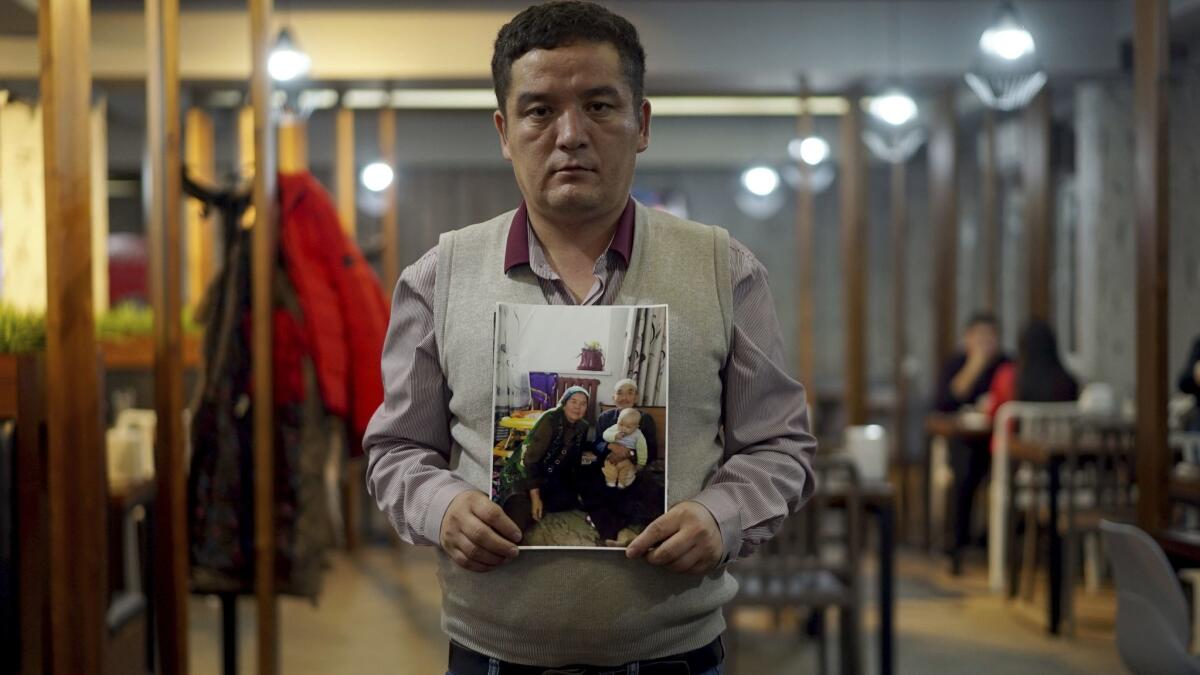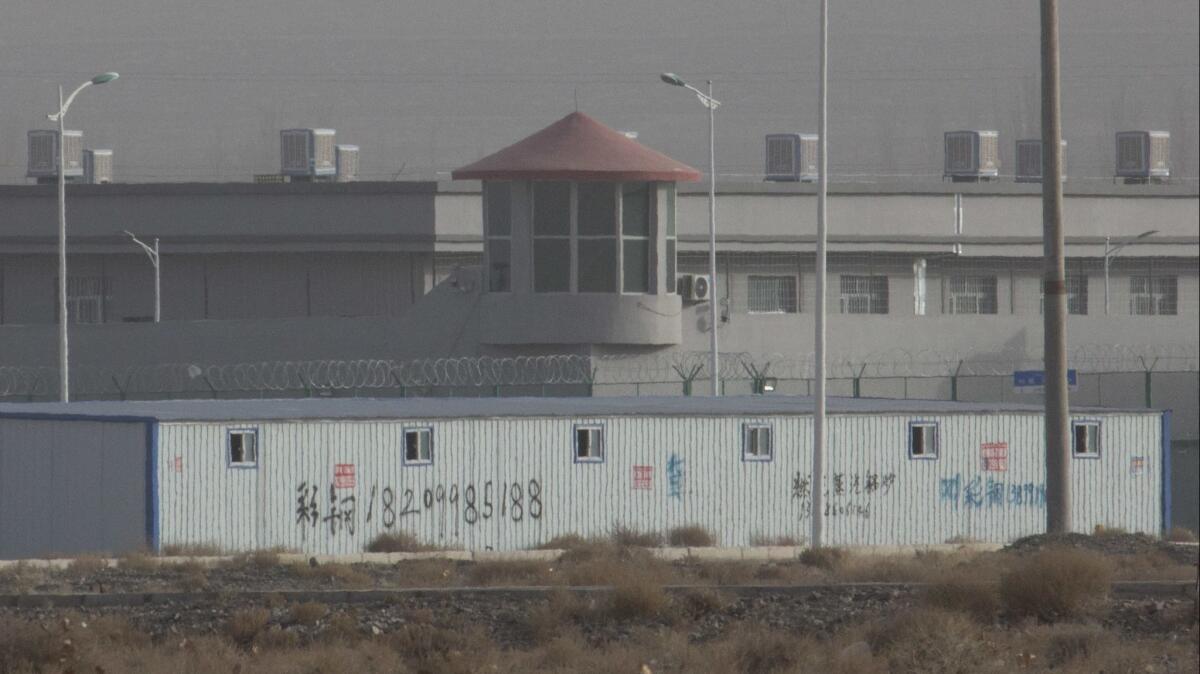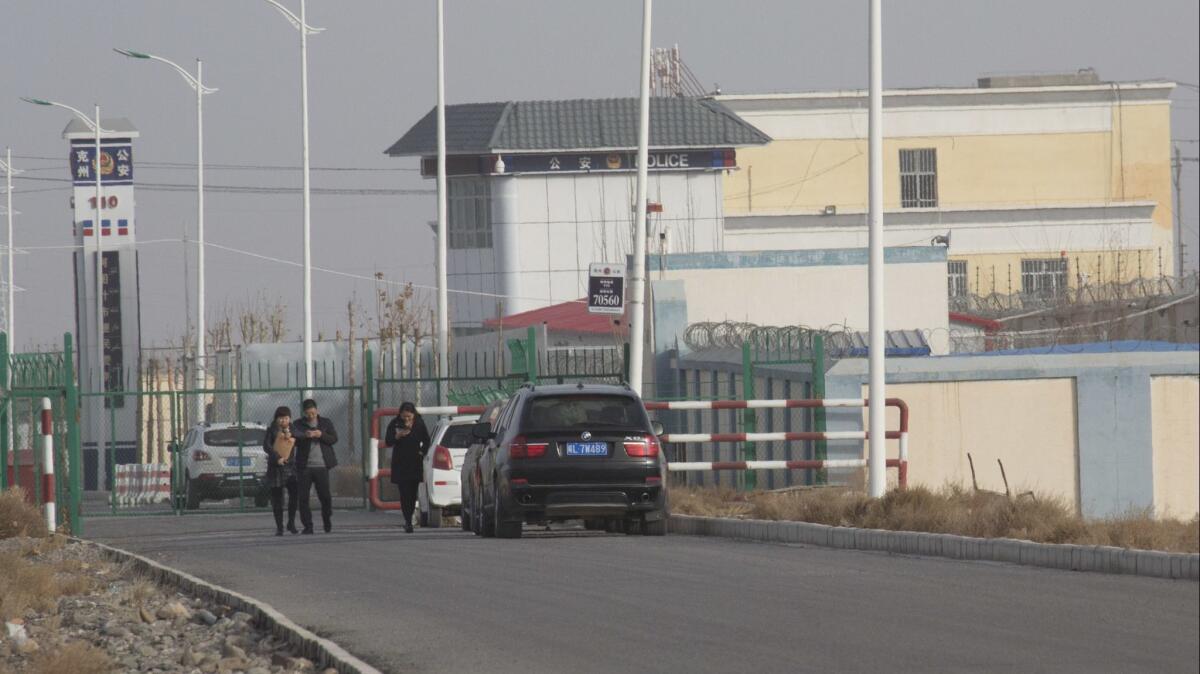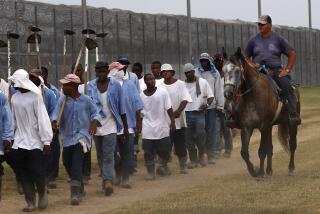U.S. sportswear traced to factory in China’s internment camps

- Share via
Chinese men and women locked in a mass detention camp where authorities are “re-educating” ethnic minorities are sewing clothes that have been imported all year by a U.S. sportswear company.
The camp, in Hotan, China, is one of a growing number of internment camps in the Xinjiang region, where by some estimates 1 million Muslims are detained, forced to give up their language and their religion and subject to political indoctrination.
Now, the Chinese government is also forcing some detainees to work in manufacturing and food industries. Some of them are within the internment camps; others are privately owned, state-subsidized factories where detainees are sent once they are released.
The Associated Press has tracked recent, ongoing shipments from one such factory — Hetian Taida Apparel — inside an internment camp to Badger Sportswear, a leading supplier in Statesville, N.C. Badger’s clothes are sold on college campuses and to sports teams nationwide, although there is no way to tell where any particular shirt made in Xinjiang ends up.
The shipments show how difficult it is to stop products made with forced labor from getting into the global supply chain, even though such imports are illegal in the United States. Badger Chief Executive John Anton said Sunday that the company would halt shipments while it investigates.
The predominantly Muslim Uighur and Kazakh ethnic minorities in China live mostly in the Xinjiang region bordering Pakistan and Afghanistan, with a legacy dating back to ancient traders on the Silk Road. In recent decades, violent attacks by Uighur militants have killed hundreds and prompted the Chinese government to blanket Xinjiang with stifling security.
About two years ago, authorities launched a vast detention and reeducation campaign. They also use checkpoints, GPS tracking and face-scanning cameras for surveillance of ethnic minorities in the region. The slightest perceived misstep can land someone in the internment camps.
Men and women in the complex that has shipped products to Badger Sportswear make clothes for privately owned Hetian Taida Apparel in a cluster of 10 workshops within the compound walls. Hetian Taida says it is not affiliated with the internment camps, but its workforce includes detainees.
Hetian Taida’s chairman, Wu Hongbo, confirmed that the company has a factory inside a re-education compound, and said it provides employment to those trainees who were deemed by the government to be “unproblematic.”
“We’re making our contribution to eradicating poverty,” Wu said.

Police told journalists who approached the compound this month that they could not take photos or film in the area because it was part of a “military facility.” Yet the entrance was marked only by a tall gate that said it was an “apparel employment training base.”
Posters line the barbed-wire perimeter, bearing messages such as “Learn to be grateful, learn to be an upright person” and “No need to pay tuition, find a job easily.”
Chinese authorities say the camps offer free vocational training for Uighurs, Kazakhs and other minorities, most of them Muslims, as part of a plan to bring them into “a modern civilized” world and eliminate poverty in the region. They say that people in the centers have signed agreements to receive vocational training.
The Xinjiang Propaganda Department did not respond to a faxed request for comment. A Chinese Foreign Ministry spokeswoman accused the foreign media Monday of making “many untrue reports” about the training centers, but she did not specify when asked for details.
“Those reports are completely based on hearsay evidence or made out of thin air,” the spokeswoman, Hua Chunying, said at a daily briefing.
However, a dozen people who either had been in a camp or had friends or family in one said that detainees they knew were given no choice but to work at the factories. Most of the Uighurs and Kazakhs, who were interviewed in exile, also said that even people with professional jobs were retrained to do menial work.
Payment varied according to the factory. Some got paid nothing, while others earned up to several hundred dollars a month, they said — barely above minimum wage for the poorer parts of Xinjiang. A person with firsthand knowledge of the situation in one county estimated that more than 10,000 detainees — or 10% to 20% of the internment population there — are working in factories, with some earning just a tenth of what they used to earn before. The person declined to be named out of fear of retribution.

A former reporter for Xinjiang TV in exile said that during his monthlong detention last year, young people in his camp were taken away in the mornings to work without compensation in carpentry and a cement factory.
“The camp didn’t pay any money, not a single cent,” he said, asking to be identified only by his first name, Elyar, because he has relatives still in Xinjiang. “Even for necessities, such as things to shower with or sleep at night, they would call our families outside to get them to pay for it.”
Rushan Abbas, a Uighur in Washington, D.C., said her sister is among those detained. The sister, Dr. Gulshan Abbas, was taken to what the government calls a vocational center, although she has no specific information on whether her sister is being forced to work.
“American companies importing from those places should know those products are made by people being treated like slaves,” she said. “What are they going to do, train a doctor to be a seamstress?”
Mainur Medetbek’s husband did odd repair jobs before vanishing into a camp in February during a visit to China from their home in Kazakhstan. She has been able to glean a sense of his conditions from monitored exchanges with relatives and from the husband of a woman in the same camp. He works in an apparel factory and is allowed to leave and spend the night with relatives every other Saturday.
Though Medetbek is uncertain how much her husband makes, the woman in his camp earns about $87 a month, less than half the local minimum wage and far less than what Medetbek’s husband used to earn.
“They say it’s a factory, but it’s an excuse for detention. They don’t have freedom. There’s no time for him to talk with me,” she said. “They say they found a job for him. I think it’s a concentration camp.”
The United States and United Nations say forced labor is a type of modern slavery, and that items made by people being exploited and coerced to work are banned from import to the United States.
It’s unclear whether other companies also export products made by forced labor in Xinjiang to the U.S., Europe and Asia. The AP found two companies exporting to the United States that share approximately the same coordinates as places experts have identified as internment camps, and Chinese media reports mention “training” there. But the AP could not confirm whether the companies use forced labor.
Rep. Christopher H. Smith (R-N.J.), a member of the House Foreign Relations Committee, called on the Trump administration Monday to ban imports from Chinese companies associated with detention camps.
“Not only is the Chinese government detaining over a million Uighurs and other Muslims, forcing them to revoke their faith and profess loyalty to the Communist Party, they are now profiting from their labor,” Smith said. “U.S. consumers should not be buying and U.S. businesses should not be importing goods made in modern-day concentration camps.”
More to Read
Inside the business of entertainment
The Wide Shot brings you news, analysis and insights on everything from streaming wars to production — and what it all means for the future.
You may occasionally receive promotional content from the Los Angeles Times.










